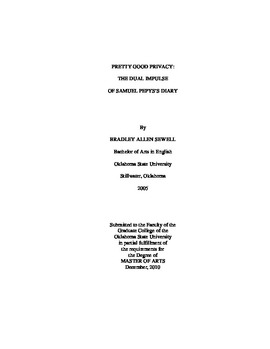| dc.contributor.author | Sewell, Bradley Allen | |
| dc.date.accessioned | 2014-04-15T22:30:10Z | |
| dc.date.available | 2014-04-15T22:30:10Z | |
| dc.date.issued | 2010-12-01 | |
| dc.identifier.uri | https://hdl.handle.net/11244/9533 | |
| dc.description.abstract | Samuel Pepys enjoys literary fame because of the diary he kept between 1660 and 1669. Pepys's encrypted diary lay undecoded and unread until the early nineteenth century. Scholars have debated whether the author anticipated future readers, or if he intended the diary for his eyes alone. Pepys's motivation for writing has rhetorical implications for readers that make the question of intention especially important for his diary. Textual and rhetorical evidence supports the idea that Pepys wrote the diary for a future audience to decode and find after his death. Pepys had no specific reader in mind, but he anticipated a humanistic audience similar to what he found in the Royal Society. The diary represents a literary vivisection of Pepys's life, and finding the external audience in Pepys highlights the diary as a seventeenth-century literary innovation that helped define the later course of literature. | |
| dc.format | application/pdf | |
| dc.language | en_US | |
| dc.publisher | Oklahoma State University | |
| dc.rights | Copyright is held by the author who has granted the Oklahoma State University Library the non-exclusive right to share this material in its institutional repository. Contact Digital Library Services at lib-dls@okstate.edu or 405-744-9161 for the permission policy on the use, reproduction or distribution of this material. | |
| dc.title | Pretty Good Privacy: the Dual Impulse of Samuel Pepyss Diary | |
| dc.type | text | |
| osu.filename | Sewell_okstate_0664M_11174.pdf | |
| osu.college | Arts and Sciences | |
| osu.accesstype | Open Access | |
| dc.description.department | English Department | |
| dc.type.genre | Thesis | |
| dc.subject.keywords | 17th century | |
| dc.subject.keywords | diary | |
| dc.subject.keywords | pepys | |
| dc.subject.keywords | samuel | |
